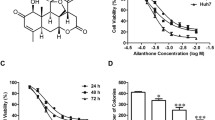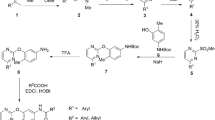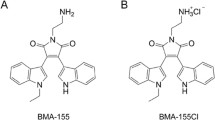Abstract
Hepatocellular carcinoma (HCC) is one of the most common solid cancers, representing the third cause of cancer-related death among cirrhotic patients. Treatment of advanced HCC has become a very active area of research. Perifosine, a new synthetic alkylphospholipid Akt inhibitor, has shown anti-tumor activity by inhibition of Akt phosphorylation. In this study, the effect of perifosine on the cell proliferation and apoptosis in hepatoma cells has been investigated. Cell growth inhibition was detected by MTT assay, cell cycle was analyzed by flow cytometry, AnnexinV-FITC apoptosis detection kit was used to detect cell apoptosis, and protein expression was examined by Western blotting analysis. Our present studies showed that Akt phosphorylation was inhibited by perifosine in HepG2 and Bel-7402 human hepatocellular carcinoma cells. Perifosine inhibited the growth of HepG2 cells and Bel-7402 cells in a dose-dependent manner, and arrested cell cycle progression at the G2 phase. Apoptosis induction became more effective with increasing perifosine concentration. The caspase cascade and its downstream effectors, Poly (ADP-ribose) polymerase (PARP), were also activated simultaneously upon perifosine treatment. The proapoptotic effect of perifosine was in part depending on regulation of the phosphorylation level of ERK and JNK. Perifosine cotreatment substantially increased cytotoxic effects of cisplatin in HepG2 cells. Down-regulating the expression of Bcl-2 and up-regulating the level of Bax may be the potential mechanism for this synergistic effect. Our findings suggest that the small molecule Akt inhibitor perifosine shows substantial anti-tumor activity in human hepatoma cancer cell lines, and is a good candidate for treatment combinations with classical cytostatic compounds in hepatocellular carcinoma.






Similar content being viewed by others

References
Anjum R, Blenis J (2008) The RSK family of kinases: emerging roles in cellular signalling. Nat Rev Mol Cell Biol 9:747–758
Arafa El-SA, Zhu Q, Barakat BM, Wani G, Zhao Q, El-Mahdy MA, Wani AA (2009) Tangeretin sensitizes cisplatin-resistant human ovarian cancer cells through downregulation of phosphoinositide 3-kinase/Akt signaling pathway. Cancer Res 69:8910–8917
Boucher E, Forner A, Reig M, Bruix J (2009) New drugs for the treatment of hepatocellular carcinoma. Liver Int 29(Suppl 1):148–158
Boutros T, Chevet E, Metrakos P (2008) Mitogen-activated protein (MAP) kinase/MAP kinase phosphatase regulation: roles in cell growth, death, and cancer. Pharmacol Rev 60:261–310
Brown MD, Sacks DB (2009) Protein scaffolds in MAP kinase signaling. Cell Signal 21:462–469
Carnero A, Blanco-Aparicio C, Renner O, Link W, Leal JF (2008) The PTEN/PI3 K/AKT signalling pathway in cancer, therapeutic implications. Curr Cancer Drug Targets 8:187–198
Chiarini F, DelSole M, Mongiorgi S, Gaboardi GC, Cappellini A, Mantovani I, Follo MY, McCubrey JA, Martelli AM (2008) The novel Akt inhibitor, perifosine, induces caspase-dependent apoptosis and downregulates P-glycoprotein expression in multidrug-resistant human T-acute leukemia cells by a JNK-dependent mechanism. Leukemia 22:1106–1116
Duan H, Luan J, Liu Q, Yagasaki K, Zhang G (2009) Suppression of human lung cancer cell growth and migration by berbamine. Cytotechnology. Dec 6. [Epub ahead of print]
Floryk D, Thompson TC (2008) Perifosine induces differentiation and cell death in prostate cancer cells. Cancer Lett 26:216–226
Franke TF (2008) PI3 K/Akt: getting it right matters. Oncogene 27:6473–6488
Fulda S (2009) The PI3 K/Akt/mTOR pathway as therapeutic target in neuroblastoma. Curr Cancer Drug Targets 9:729–737
Gills JJ, Dennis PA (2010) Perifosine: update on a novel Akt inhibitor. Curr Oncol Rep 11:102–110
Khavari TA, Rinn J (2007) Ras/Erk MAPK signaling in epidermal homeostasis and neoplasia. Cell Cycle 6:2928–2931
Kondapaka SB, Singh SS, Dasmahapatra GP, Sausville EA, Roy KK (2003) Perifosine, a novel alkylphospholipid, inhibits protein kinase B activation. Mol Cancer Ther 2:1093–1103
Leonard R, Hardy J, van Tienhoven G, Houston S, Simmonds P, David M, Mansi J (2001) Randomized, double-blind, placebo-controlled, multicenter trial of 6% miltefosine solution, a topical chemotherapy in cutaneous metastases from breast cancer. J Clin Oncol 19:4150–4159
Liu LZ, Zhou XD, Qian G, Shi X, Fang J, Jiang BH (2007) AKT1 amplification regulates cisplatin resistance in human lung cancer cells through the mammalian target of rapamycin/p70S6K1 pathway. Cancer Res 67:6325–6332
Manning BD, Cantley LC (2007) AKT/PKB signaling: navigating downstream. Cell 129:1261–1274
Mínguez B, Tovar V, Chiang D, Villanueva A, Llovet JM (2009) Pathogenesis of hepatocellular carcinoma and molecular therapies. Curr Opin Gastroenterol 25:186–194
Parkin DM, Bray F, Ferlay J, Pisani P (2005) Global cancer statistics. CA Cancer J Clin 55:74–108
Patel V, Lahusen T, Sy T, Sausville EA, Gutkind JS, Senderowiczl AM (2002) Perifosine, a Novel Alkylphospholipid, Induces p21WAF1 Expression in Squamous Carcinoma Cells through a p53-independent Pathway, Leading to Loss in Cyclin-dependent Kinase Activity and Cell Cycle Arrest. Cancer Res 62:1401–1409
Vlahos CJ, Matter WF, Hui KY, Brown RF (1994) A specific inhibitor of phosphatidylinositol 3-kinase, 2-(4-morpholinyl)-8-phenyl-4H–1-benzopyran-4-one (LY294002). J Biol Chem 269:5241–5248
Wagner EF, Nebreda AR (2009) Signal integration by JNK and p38 MAPK pathways in cancer development. Nat Rev Cancer 9:537–549
Wang D, Wang Z, Tian B, Li X, Li S, Tian Y (2008) Two hour exposure to sodium butyrate sensitizes bladder cancer to anticancer drugs. Int J Urol 5:435–441
Yang X, Fraser M, Moll UM, Basak A, Tsang BK (2006) Akt-mediated cisplatin resistance in ovarian cancer: modulation of p53 action on caspase-dependent mitochondrial death pathway. Cancer Res 66:3126–3136
Yuen MF, Hou JL, Chutaputti A (2009) Hepatocellular carcinoma in the Asia pacific region. J Gastroenterol Hepatol 24:346–353
Zeisig R, Arndt D, Stahn R, Fichtner I (1998) Physical properties and pharmacological activity in vitro and in vivo of optimized liposomes prepared from a new cancerostatic alkylphospholipid. Biochim Biophys Acta 1414:238–248
Acknowledgments
This work was supported by grants from the National Natural Science Foundation of China (No 30800422).
Author information
Authors and Affiliations
Corresponding author
Rights and permissions
About this article
Cite this article
Fei, Hr., Chen, G., Wang, Jm. et al. Perifosine induces cell cycle arrest and apoptosis in human hepatocellular carcinoma cell lines by blockade of Akt phosphorylation. Cytotechnology 62, 449–460 (2010). https://doi.org/10.1007/s10616-010-9299-4
Received:
Accepted:
Published:
Issue Date:
DOI: https://doi.org/10.1007/s10616-010-9299-4



